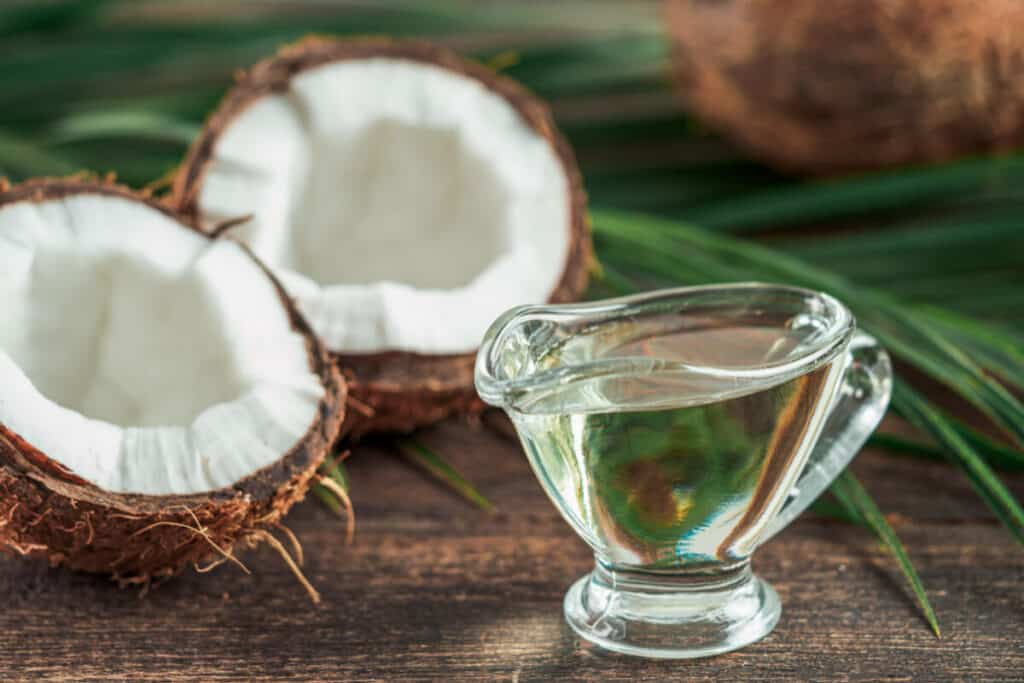
What Are Medium Chain Triglycerides?
Most of the fats we eat are long-chain triglycerides (LCTs), which are made up of 18 to 20 carbon atoms. (1) For the body to digest LCTs, they must first be broken down by bile and pancreatic enzymes before traveling through the lymphatic system and into the bloodstream. LCTs are then transported to the liver where they are converted into ketones. (40) MCTs, on the other hand, are an easily digestible type of saturated fat made up of just 8 to 10 carbon atoms. Unlike LCTs, they are directly transported to the liver where they are converted into ketones. (3)(38) Another difference? Due to their shorter carbon chain, MCTs are typically digested before they can be stored as body fat. (12) Did you know? While LCTs provide 9.2 calories per gram, MCTs clock in at a slightly lower calorie count of 8.3 calories per gram. (28)
 Coconuts oil is a rich source of medium-chain triglycerides.
Coconuts oil is a rich source of medium-chain triglycerides.
What Is MCT Oil?
MCT oil is a concentrated source of medium-chain triglycerides made by refining raw coconut or palm oil to remove other compounds or contaminants.
The result is a liquid oil containing 100% medium-chain triglycerides. (18)(28)
How to Obtain MCTs
LCTs are widely found in foods like oily fish (e.g., salmon), red meat, egg yolks, and even some fruits, herbs, nuts, and seeds. But MCTs can only be obtained from a few dietary sources. (1) Medium-chain triglyceride foods include:
- Butter
- Cheese
- Coconut oil
- Full-fat cow’s, sheep’s or goat’s milk
- Human breast milk
- Palm kernel oil
- Yogurt
What Food(s) Have the Highest Amount of MCTs?
The highest amount of MCTs are found in coconut and palm kernel oil, with just small amounts found in dairy products. Since most people don’t eat coconut or palm kernel oil on a regular basis, taking MCT oil supplements may be an easier way to incorporate these healthy fats into your daily diet.
7 Health Benefits of MCT Oil
Proponents of MCT oil have credited it as a dietary supplement with an array of proven health benefits. Here’s what the science says about MCT oil:
1. Improves Blood Sugar Levels Studies suggest that a daily dose of MCT oil may help improve insulin sensitivity and foster modest weight loss in those with metabolic syndrome and type 2 diabetes. (22)(36) In one small study involving 40 people with type 2 diabetes, those who took MCT oil supplements experienced weight loss as well as a reduction in waist circumference and insulin resistance compared to those consuming corn oil containing LCTs. (10) 2. Supports Brain Health MCTs are transformed into ketones, which support brain fuel supply as they can be used by the brain as an alternative source of fuel (glucose is the brain’s primary energy source). (13) This has sparked interest among some researchers into the possible role MCTs might play in treating certain brain disorders. Some evidence even suggests that MCTs can improve learning, memory, and brain function in people with dementia and Alzheimer’s disease. (8)(24)(29) Other studies suggest that MCT oil may help children with autism and people suffering from epilepsy. (15)(16) During one of these studies, MCT oil was found to reduce epileptic seizures more effectively than a common seizure medication. (5) 3. Helps with Cardiovascular Health MCTs have been shown to improve high cholesterol in both human and animal studies. One study of 24 overweight men found that taking an MCT oil mixture with flaxseed oil and phytosterols reduced total cholesterol levels by 12.5%. When the participants were given a blend that traded MCT oil for olive oil, total cholesterol only dropped by 4.7%. (31) Another study that appeared in the journal Open Heart found that MCT oil also raised high-density lipoprotein (HDL) cholesterol (good cholesterol) levels, thus promoting a healthier cholesterol ratio. (18) Other research suggests that, thanks to these actions, MCT oil may also help prevent atherosclerosis—the stiffening and narrowing of arteries. (37)
One of the health benefits of MCT oil is that it may help boost your endurance during workouts, further aiding your weight management goals.
4. Provides Energy to Support Exercise Performance
Since MCT oil is rapidly digested, some studies suggest that it may serve as an effective source of energy during exercise. (27) One recent study that appeared in the journal PLoS ONE reports that dietary MCT oil enhances both exercise performance and endurance. (39) This confirms earlier research reporting that MCTs improved endurance in recreational athletes participating in high-intensity exercise. (23) 5. Promotes Gastrointestinal Health MCT oil promotes a healthier microbiome by fostering bacterial diversity while also strengthening the intestinal barrier. This may help prevent dysbiosis and improve both gastrointestinal and metabolic health, according to Nutrients. (25) According to a paper published in Practical Gastroenterology, people with pancreatic insufficiency—a condition in which the pancreas can’t produce enough of the enzymes needed to digest food—as well as those who have had part of the stomach or small bowel removed may see health benefits from MCTs. Specifically, MCT oil may help reduce the excess fecal fat (steatorrhea) that often occurs in these conditions. (28) 6. Reduces Inflammation Inflammation has been linked to a wide range of chronic diseases, from brain disorders to heart disease. (11) According to a study in the journal Nutrition in Clinical Practice, MCT oil acts as an anti-inflammatory by downregulating pro-inflammatory cytokines and elevating anti-inflammatory cytokines. (41) Earlier research found that MCT oil was more effective than other oils for reducing the body’s inflammatory response. In one study involving 60 preterm newborns, those who received intravenous MCT oil with omega-3 fatty acids had significantly lower levels of key inflammatory markers compared to those receiving a soy oil infusion. (30) 7. Aids in Weight Loss According to the Centers for Disease Control and Prevention, 73.6% of American adults are overweight. Among those, 42.5% are considered obese. (36) Studies suggest that MCTs may provide a modest benefit to people looking to lose weight. (14)(32)(33) In one review of 13 studies, researchers found that overweight people who consumed MCTs instead of LCTs experienced a greater decrease in their overall weight, as well as in their hip and waist circumference. The studies that were evaluated also pointed to a higher loss of total body fat, subcutaneous fat, and visceral fat in those routinely consuming MCT oil daily. (20) These effects may be due to the MCTs ability to modulate the hormones that regulate appetite, boost the feelings of fullness, and support calorie and fat burning.(17)(34)

Get the health benefits of MCT oil by adding it to smoothies, shakes, or salad dressings. How to Choose and Use MCT Oil Some people believe that coconut oil and MCT oil can be used interchangeably. While coconut oil is a rich source of MCTs, it also contains LCTs and unsaturated fats. (26) Conversely, MCT oil is a clear, flavorless liquid that contains concentrated medium-chain triglycerides. When choosing an MCT oil, look for a reputable brand that specifies pure, 100% MCT oil. MCT oil can be taken straight from the bottle or it can be added to smoothies, protein shakes, and homemade salad dressings. You can also enjoy MCT oil in coffee. (2) However, unlike coconut oil, MCT oil has a low smoke point, so it is not recommended for cooking. (3) Did you know? MCT oils are synthetically made to ensure purity since natural sources (like coconut oil) contain other fats and compounds that may not bestow the same health benefits. MCT Oil Dosage Although there is no official dietary guideline for the tolerable upper limit for MCTs, a maximum dosage of 4 to 7 tbsp has been suggested. (28) Most studies have used 1 to 5 tbsp. MCT Oil Side Effects Even though MCT oil is generally well tolerated, it’s important to note that these amounts can initially cause gastrointestinal problems such as nausea, abdominal cramping, vomiting, and diarrhea in some people. (6) To mitigate these side effects, it’s a good idea to begin with a small amount (e.g., 1 tsp) of MCT, gradually increasing your intake over time. MCT Oil’s Benefits Summarized While there isn’t a magic solution that will have you fitting into your skinny jeans overnight, research suggests that adding MCT oil to your daily wellness routine might provide an array of health benefits. These benefits include improved brain, heart, and gastrointestinal health, and even help in promoting weight loss. While MCT oil may trigger some gastrointestinal symptoms, it is generally considered safe. (19)